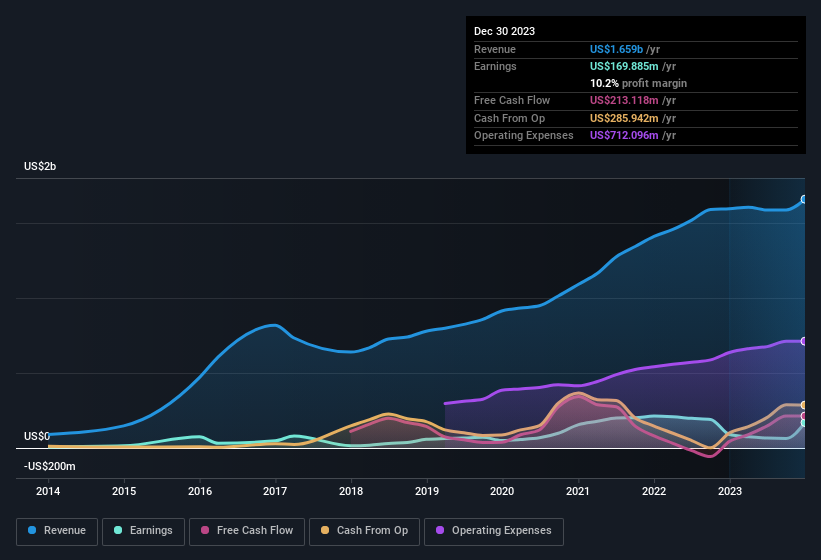- United States
- /
- Leisure
- /
- NYSE:YETI
Statutory Profit Doesn't Reflect How Good YETI Holdings' (NYSE:YETI) Earnings Are
YETI Holdings, Inc.'s (NYSE:YETI) earnings announcement last week was disappointing for investors, despite the decent profit numbers. We have done some analysis and have found some comforting factors beneath the profit numbers.
View our latest analysis for YETI Holdings

A Closer Look At YETI Holdings' Earnings
As finance nerds would already know, the accrual ratio from cashflow is a key measure for assessing how well a company's free cash flow (FCF) matches its profit. The accrual ratio subtracts the FCF from the profit for a given period, and divides the result by the average operating assets of the company over that time. You could think of the accrual ratio from cashflow as the 'non-FCF profit ratio'.
Therefore, it's actually considered a good thing when a company has a negative accrual ratio, but a bad thing if its accrual ratio is positive. While having an accrual ratio above zero is of little concern, we do think it's worth noting when a company has a relatively high accrual ratio. To quote a 2014 paper by Lewellen and Resutek, "firms with higher accruals tend to be less profitable in the future".
Over the twelve months to December 2023, YETI Holdings recorded an accrual ratio of -0.11. Therefore, its statutory earnings were quite a lot less than its free cashflow. To wit, it produced free cash flow of US$213m during the period, dwarfing its reported profit of US$169.9m. YETI Holdings' free cash flow improved over the last year, which is generally good to see.
That might leave you wondering what analysts are forecasting in terms of future profitability. Luckily, you can click here to see an interactive graph depicting future profitability, based on their estimates.
Our Take On YETI Holdings' Profit Performance
YETI Holdings' accrual ratio is solid, and indicates strong free cash flow, as we discussed, above. Based on this observation, we consider it likely that YETI Holdings' statutory profit actually understates its earnings potential! Furthermore, it has done a great job growing EPS over the last year. Of course, we've only just scratched the surface when it comes to analysing its earnings; one could also consider margins, forecast growth, and return on investment, among other factors. While it's really important to consider how well a company's statutory earnings represent its true earnings power, it's also worth taking a look at what analysts are forecasting for the future. Luckily, you can check out what analysts are forecasting by clicking here.
This note has only looked at a single factor that sheds light on the nature of YETI Holdings' profit. But there is always more to discover if you are capable of focussing your mind on minutiae. Some people consider a high return on equity to be a good sign of a quality business. So you may wish to see this free collection of companies boasting high return on equity, or this list of stocks that insiders are buying.
New: Manage All Your Stock Portfolios in One Place
We've created the ultimate portfolio companion for stock investors, and it's free.
• Connect an unlimited number of Portfolios and see your total in one currency
• Be alerted to new Warning Signs or Risks via email or mobile
• Track the Fair Value of your stocks
Have feedback on this article? Concerned about the content? Get in touch with us directly. Alternatively, email editorial-team (at) simplywallst.com.
This article by Simply Wall St is general in nature. We provide commentary based on historical data and analyst forecasts only using an unbiased methodology and our articles are not intended to be financial advice. It does not constitute a recommendation to buy or sell any stock, and does not take account of your objectives, or your financial situation. We aim to bring you long-term focused analysis driven by fundamental data. Note that our analysis may not factor in the latest price-sensitive company announcements or qualitative material. Simply Wall St has no position in any stocks mentioned.
About NYSE:YETI
YETI Holdings
Designs, retails, and distributes outdoor products under the YETI brand name.
Flawless balance sheet and fair value.
Similar Companies
Market Insights
Community Narratives


Recently Updated Narratives


Q3 Outlook modestly optimistic


Alphabet: The Under-appreciated Compounder Hiding in Plain Sight


MINISO's fair value is projected at 26.69 with an anticipated PE ratio shift of 20x
Popular Narratives


The company that turned a verb into a global necessity and basically runs the modern internet, digital ads, smartphones, maps, and AI.


MicroVision will explode future revenue by 380.37% with a vision towards success



